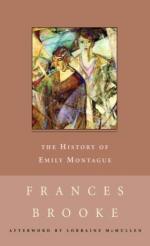|
This section contains 3,762 words (approx. 13 pages at 300 words per page) |

|
SOURCE: "Frances Brooke's Emily Montague (1769): Canada and Woman's Rights," in Women's Studies, Vol. 12, No. 1, 1986, pp. 7-16.
In the following essay, Boutelle argues that Brooke's aim in The History of Emily Montague went beyond providing a colorful novel of Canadian frontier life, suggesting that she intended it to serve in part as a document in favor of women's rights and on the current unequal state of relations between men and women. Boutelle maintains that with this intent Brooke's novel foreshadows the overtly feminist work of Margaret Fuller and Mary Wollstonecraft.
Today we remember Frances Brooke, if we remember her at all, as the first Canadian novelist. As a result of her husband's 1763 appointment to the chaplaincy of the garrison at Quebec, Brooke spent several years in the newly British colony of Canada, and she used this experience as background in her second novel, The History of Emily Montague (published...
|
This section contains 3,762 words (approx. 13 pages at 300 words per page) |

|


